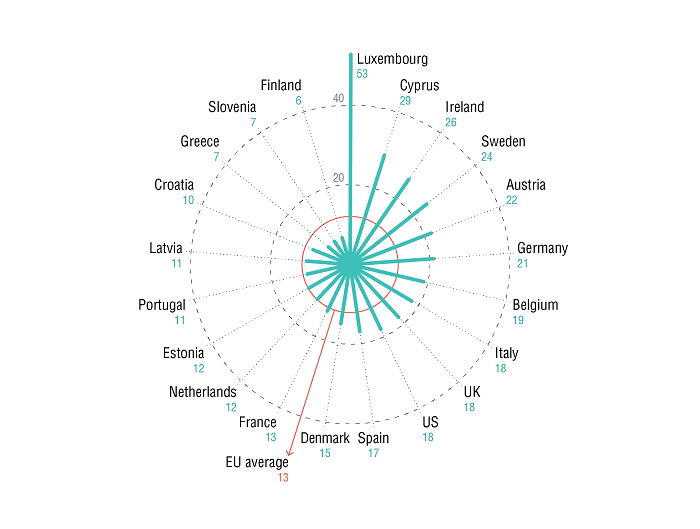So, lorry drivers no longer want to drive to and from the UK, shortages of care workers is the next crisis in waiting and the hospitality sector is struggling too. Why? And most importantly, what to do?
Whether you believe the problem to be Brexit, Covid or both, it is clear that the solution to these ongoing labour shortages in key sectors of the British economy is an immigration system, that helps supply the sort of skills and workers that the British economy and, crucially, British society needs. Which is most definitely not what we have. But how to change it? There are of course technical and legal fixes to put in place, but there is more.
‘There is no such thing as a low-skilled worker’
First and foremost, skills. All skills. The British post-Brexit immigration system marked a fundamental departure from the flexibility of ‘free movement’ where any EU citizen could freely live and work in the UK – in favour of a points-based system designed to attract desirable ‘high skilled workers’ and deter those whose ‘low’ skills are deemed to be less beneficial to the economy. Big mistake.
Never has it been more apparent that in the past 18 months that economies and societies need a range of skills and jobs to survive. We have clapped for the doctors and nurses of the NHS, but most importantly we have learnt and crucially experienced in our daily lives the value and essential role of delivery drivers, supermarket cashiers, fruit pickers and many other ‘key workers’. They were essential before Covid hit, but Covid brought it home for all of us.
Share of migrant workers in the essential workforce by country (%)
The reality is, there is no such thing as a low skilled worker: rather, there are workers and skills that economies and societies need, in different sectors and at different times.
It is therefore not pragmatic and pretty counterproductive to have a system that pre-selects on paper ‘desirable’ workers based on level of education/qualifications rather than one that better matches actual labour market gaps with people’s acquired experience as well as key characteristics that would benefit the economy in the long run, such as the ability and interest to learn new skills. This will be key to support the sort of economic transformation needed to achieve a low carbon transition or to transform our struggling social care sector in the face of rapid population ageing.
Fulfill the aspirations shared by all people on the move
Second, aspirations. People move for different reasons, some freely, others not. But the one thing that all people on the move have in common are the human aspirations, wishes and desires that we all share: being respected and valued for the contribution we make to our communities, opportunities for our children, and of course safety. These are not trade-offs. All these aspirations are real, legitimate and can and should be fulfilled at once if we are to remain an attractive destination for much needed essential workers from all over the globe.
So providing asylum seekers with shelter and safety but no right to work is just not good enough, it will not fulfil their potential and it will limit their contribution to our economies and societies. Similarly, a visa scheme that expiries just in time for Christmas will not attract the skilled HGV drivers that we so desperately need. And what will we do when it will be the care workers turn – a certainty given the sky-high shortages – another short-term scheme to be wrapped up by Easter?
Let’s get a grip: we just cannot afford to begin the long and painful process of the Covid recovery with a series of ill-designed and poorly thought through short term fixes. We need – and can get – an incentive-based immigration system that attracts the workers that are needed and supports them to make and enjoy a life in the UK, based on equality and a fairness. Which of course is what humanity is all about. Not just solidarity.
Change the story we tell in the migration debate
Third, and last: the story we tell. I have for some time been thinking that we, the so called globalists, have too often got the wrong end of the stick in the big migration debate that started with the so called European crisis in 2015. In an attempt to safeguard international law, protect lives, and express our outrage to the ‘hostile environment’ we have contributed to a skewed and ultimately unhelpful story about the reality of human mobility.
We have made this a story about ‘them’, rather than all of us. We have insisted on categories and labels, we have negotiated different deals for different kinds of migrants, we have not challenged the idea that it may not be ok for some migrants to have more rights than others, or that some are deserving and others are not. We continue to refer to migrants as vulnerable groups, not as fellow human beings who make a difference to this world. We have let politics and emotions set the tone of the debate, rather than what could work and how. Ironically, we may have built walls, not bridges.
Take the tweet below from the special envoy of UNHCR for the Western and Central Mediterranean. It was clearly intended to safeguard the asylum system but it once again reinforces the negative narrative of ‘economic migrants’ with no rights or legal pathways to access the very European labour markets that so desperately need them.
686 persons arrived in Lampedusa yesterday #Italy. Most of them are economic migrants who will not be eligible to reside in Europe. Countries of origin have to be faster in readmitting their nationals if we want to see progress on asylum management and legal migration pathways
— vincent cochetel (@cochetel) September 28, 2021
We do not need a warm welcome, for Afghan refugees or European lorry drivers. We need long term visas, good working conditions, fair pay, opportunities for skills development and good quality basic services. And we need this for all of us, not ‘them’. It is after all our collective future that is at stake.




